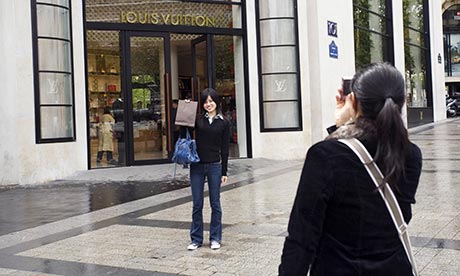Romance of Paris fades for Chinese tourists targeted by thieves
Outlying hotels blacklisted as Asia's growing ranks of overseas tourists close ranks against criminal gangs

Big spenders … Chinese
tourists carrying boutique shopping bags are easy prey for thieves,
especially in the suburban hotels where they tend to stay. Photograph:
Julien Chatelin/Rex Features
Gan Di, a medical student, took his wife there after their June wedding. Aged 27, he belongs to the balinghou, or "post-1980" generation, those who benefited from the economic reforms of the past 20 years and now travel around the world – as 83 million Chinese did in 2012. But his Parisian honeymoon turned sour after a ride on the Metro. "It was very crowded and they took advantage of us being pressed together," he said. The pickpockets made off with his phone and wallet.
Thefts targeting Chinese and Asian tourists have grown hugely over the past two years. The French police don't register the nationality of victims of crime, but there is no shortage of eyewitness accounts. In April, staff at the Louvre Museum went on strike because of the pickpocket invasion.
One explanation is that Chinese tourists often carry large amounts of cash. Chinese and Japanese tourists are also known to spend freely, with an average of between €800-€1,200 ($1,000-$1,500), mostly in luxury Champs Elysées boutiques. With expensive brand names on their shopping bags, they are an easy prey for thieves, especially in the suburban hotels where many stay.
The most audacious thefts can occur even before Chinese visitors set foot in the city, on the A1 motorway from the airport, which is notorious for traffic jams. On at least two occasions, organised gangs attacked tourist minibuses. They wait for the bus to reach a standstill, break the windows and snatch bags from terrified occupants.
The French police have been on alert since this wave of muggings started. In April they strengthened their presence at tourist sites and the number of thefts fell by 12% within a few weeks, compared with 2012 figures. However, they are helpless when faced with the professional gangs that work areas such as the Eiffel Tower.
In central Paris the pickpockets are mainly young eastern Europeans controlled by criminal networks that are hard to dismantle, especially since the thieves are teenagers and don't carry IDs. Being under age, they are released very quickly.
Furthermore, Asian tourists such as Gan Di rarely file complaints. The police station by the Eiffel Tower only gets between 60 and 80 per month. "The tourists are usually with tour operators and simply don't have two hours to spend in a police station," said Serge Leduc, head of security at the Louvre.
Tales flourish on the popular Chinese microblogging sites. Chinese-born Cai Situ, who runs an independent press agency in Paris, opened an account on the most popular one, Weibo, called "Public security news from Paris" and collects accounts of theft and muggings. On the same site, the head of an advertising agency is offering T–shirts for prospective travellers to Paris, with the French for "I only have a credit card" on them.
The increase in incidents has led to diplomatic tensions between the two countries. In June, a violent attack on six Chinese students attending a prestigious oenology school near Bordeaux further exacerbated anti-French sentiment in China, leading to criticisms of the lure of the French wine industry, so prized by Chinese investors. When 40 major Chinese business leaders visited Paris the same month, they raised the issue of security with president François Hollande and received the special protection usually reserved for heads of state.
In 2010, the Chinese diaspora in the Belleville district of Paris demonstrated against the attacks, especially those during weddings when people traditionally offer cash gifts. Now complaint forms are available in Chinese.
The regional tourist office says that the figures show no drop in Asian visitors but the chairman, Jean-Pierre Blat, has long-term concerns: "With the growth of emerging countries, we could see between 10-15 million more tourists by 2020, and we just don't have the capacity to deal with them."
One problem is the lack of security in suburban hotels. In central Paris, hotel capacity is at saturation point and new ones can only be built outside the ring road, in precisely the areas now avoided by the Chinese tour operators. Jean-François Zhou, the founder of Ansel Travel, says that the Chinese blacklist hotels whose clients have been the victims of theft. He now tries to get his clients into central hotels, even if it raises the cost of his services.
On 11 June the Paris police announced 26 measures to promote the safety of tourists, with a greater police presence in areas popular with Asian visitors. The long-term aim is to change their cash habits by promoting awareness and working with the Chinese, Japanese and South Korean embassies. The plan also entails more police patrols in the hotel areas of Seine-Saint-Denis outside the city proper.
The Louvre has gone one step further by setting up an international telephone line and a computer to help tourists report thefts. It is in a prominent location, under the glass pyramid.
No comments:
Post a Comment
Comments always welcome!